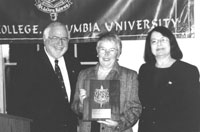|

Inside
District 15 with Superintendent Carmen Fariña
“A
District That Is Really Moving”
By
Marylena Mantas
On
the first Tuesday of every month, parents and educators of Community
School District 15 gather at local restaurants and dine together.
The “dinner date” initiative, launched to support local businesses
and the district’s public school system, which receives a percentage
of the proceeds, has become possible after months of systematic
meetings seeking to open the lines of communication among members
of the district.
According to Superintendent Carmen Fariña, establishing this sense
of community became her first priority when she was appointed
approximately one year ago.
“It
was very hard,” said Fariña, adding that it took six months to
meet her goal. “We met, met and met until I got a good sense of
what everyone was worried about.”
Her experience in the field of education and familiarity with
the district—where she lives and was a teacher for 22 years and
the director of curriculum for five years—have given Fariña the
management expertise, organization skills and networking abilities
necessary to effectively administer one of the largest school
districts in Kings County, serving approximately 21,000 students.
“You
need to have people on board with information,” she said. “You
can’t become a superintendent without many years in the field.”
Recently, the district has concentrated its efforts on staff development
through developing a unique model based on collaboration with
programs such as City College’s Math In the City and the Reading
and Writing Institute at Teachers College.
“District
15 is a place where a lot of professional development is taking
place,” said Ernestine Volpe, principal of PS 295. “This is a
district that is really moving. We are a group
of people who are learning constantly. This openness allows us
to grow professionally and educationally.”
In addition, elementary schools in the district have been placed
into clusters that concentrate on developing a successful academic
model for one academic theme. Clusters are responsible for sharing
the expertise they acquire with other schools in the district
that will replicate the successful model.
“Through
the cluster system everyone has something to offer,” said Fariña.
“It’s hard to go school–to–school to make change, but if you have
three schools working together, change is more feasible.”
The principals of schools placed in these clusters meet at least
twice a month and their schools share resources, such as staff
development and afterschool programs. In addition, they often
hold joint PTA meetings and school activities. Volpe, whose school
participates in the Enrichment cluster, finds the system “very
effective” and stated that it fosters “a lot of talking and collaboration.”
“In
this neighborhood you find kids with mixed backgrounds,” she said.
“The cluster system provides a balance. We create a school community
where everyone is learning.”
A member of the Superintendent’s cabinet oversees the progress
made by each cluster. According to Fariña, the cabinet, which
meets once a week, has become instrumental in facilitating change
and progress.
“We
really are a team,” said Fariña. “I don’t make all the decisions.
I expect them [the cabinet] to come up with its own ideals and
agendas. I want people with divergent views, but also people who
are autonomous.”
Cabinet members assist the Superintendent in maintaining a hands-on
approach and being aware of developments in the district’s schools,
which she visits continuously. “When I leave a school I’ll say,
I’m sending someone tomorrow to help you work on this problem,”
she said.
The Superintendent hopes to expand the cluster system to middle
schools by next year and to establish a centralized Pre-K system
that
will move all Pre-K programs to one site by September of 2002.
Although she wants to see an increase in reading and math scores,
the Superintendent underscored that it does not constitute the
basic premise of her vision. Rather, she will measure success
by parents who opt to keep their children in the district instead
of sending them to private school. Her goal is to foster self-esteem
in students based on a strong academic background and a compassion
for others.
“I’d
like to see students have ownership of their own learning and
develop a sense of independence,” she said. “My father instilled
within me the basic belief that we don’t go to
school to get the answers, but to raise the questions.”#
Education Update, Inc., P.O. Box 20005, New York, NY 10001. Tel:
(212) 481-5519. Fax: (212) 481-3919. Email: ednews1@aol.com.
All material is copyrighted and may not be printed without express consent of
the publisher. © 2001.
|

